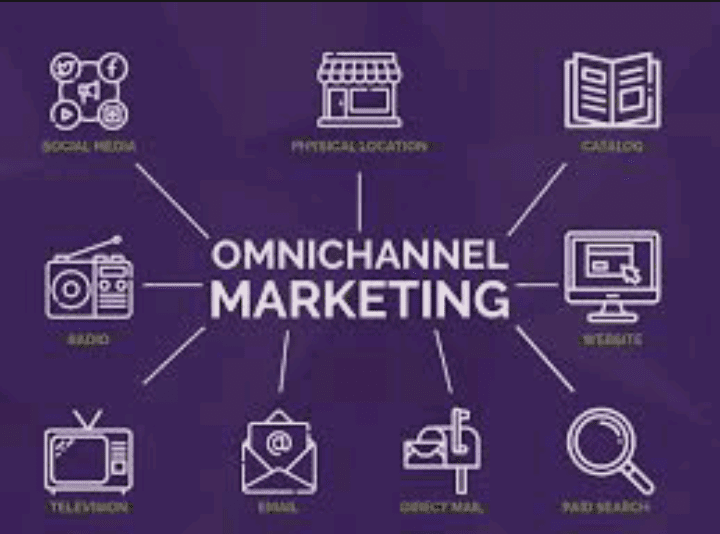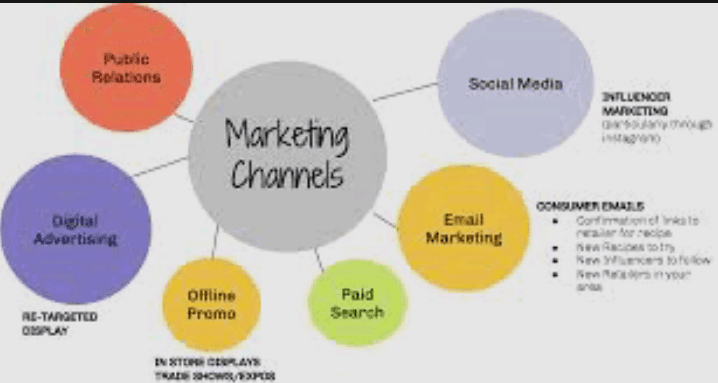Marketing channels (channel marketing) refer to the various mediums through which a business can reach its target customers and promote its products or services.
The choice of marketing channel is crucial for the success of any marketing campaign as it affects the reach, effectiveness and cost of the campaign.
There are several types of marketing channels, including:
Direct Marketing: This involves direct communication with the target customers through various mediums such as email, direct mail, telemarketing, and SMS marketing.
Direct marketing enables businesses to reach their target customers directly and personalize their messages to increase the effectiveness of the marketing campaign.
Online Marketing: This includes digital marketing channels such as search engine marketing (SEM), search engine optimization (SEO), social media marketing, and display advertising.
Online marketing enables businesses to reach their target customers through the internet, and provides a cost-effective way to reach a large audience.
Traditional Marketing: This includes traditional advertising mediums such as print advertisements in newspapers, magazines, and brochures, as well as television and radio advertisements.
Traditional marketing enables businesses to reach a large audience, but it can be expensive and may not provide the same level of personalization as direct marketing.
Referral Marketing: This involves encouraging current customers to refer new customers to the business. Referral marketing can be an effective marketing channel as it leverages the trust and reputation of current customers to attract new ones.
Influencer Marketing: This involves partnering with individuals who have a large following on social media platforms and leveraging their influence to reach the target customers.
Influencer marketing can be an effective marketing channel as it provides access to a large, engaged audience and can help build brand credibility and trust.
When selecting a marketing channel, businesses should consider the target audience, the objective of the marketing campaign, and the budget for the campaign.
It is important to choose a marketing channel that will reach the target audience effectively and provide a positive return on investment.
Marketing channels play a critical role in the success of a marketing campaign, and businesses should carefully consider their options when selecting a marketing channel.
Bychoosing the right marketing channel, businesses can reach their target customers, promote their products or services effectively, and ultimately achieve their marketing goals.
Read Also: A Comprehensive Guide To Boosting Your Business With A Top Notch Marketing Company
Omnichannel Marketing

Omnichannel marketing is a strategy that leverages multiple touchpoints and channels to engage customers and build strong relationships with them.
With the rise of digital channels, omnichannel marketing has become an essential approach for businesses that want to remain relevant and competitive in today’s fast-paced and dynamic market environment.
The omnichannel approach is all about providing a seamless, integrated, and consistent customer experience across all touchpoints, whether it’s a website, a brick-and-mortar store, social media, email, or any other channel.
This type of marketing strategy is designed to meet the evolving needs and preferences of customers, who expect a personalized and seamless experience whenever and wherever they interact with a brand.
One of the key benefits of omnichannel marketing is that it enables businesses to reach their target audience at the right place and time, using the channels that are most relevant to them.
For example, a customer who prefers to shop online can receive personalized product recommendations via email, while another customer who prefers in-store shopping can receive promotions and discounts through a mobile app.
Another important benefit of omnichannel marketing is that it enables businesses to build stronger relationships with their customers by providing a consistent and personalized experience across all touchpoints.
This can help to increase customer loyalty and engagement, and ultimately, drive more sales and revenue.
To be successful with omnichannel marketing, it’s important to have a comprehensive understanding of your target audience and their behavior across all channels.
This requires businesses to have access to accurate and up-to-date customer data, as well as the tools and technologies to analyze and leverage this information.
Additionally, omnichannel marketing requires a strong organizational structure and a culture of collaboration, as it often involves multiple teams and departments working together to create a seamless customer experience.
This requires businesses to have clear processes, clear communication, and a shared understanding of the goals and objectives of the omnichannel marketing strategy.
Omnichannel marketing is a crucial approach for businesses that want to remain relevant and competitive in today’s fast-paced and dynamic market environment.
By leveraging multiple touchpoints and channels, businesses can reach their target audience at the right place and time, build stronger relationships with their customers, and drive more sales and revenue.
However, it requires a comprehensive understanding of the target audience, access to accurate customer data, and a strong organizational structure and culture of collaboration.
Importance of Channel Marketing
Channel marketing is a crucial component of a company’s overall marketing strategy, as it involves developing and executing programs to effectively promote products or services through various channels.
Channel marketing is the process of creating and managing relationships with intermediaries that help to reach the end customer. The intermediaries can be retailers, wholesalers, distributors, or any other partner that helps in getting the product to the market.
Here are some of the key reasons why channel marketing is so important for businesses:
Increased reach: Channel marketing allows companies to reach a wider audience than they would be able to through direct marketing efforts.
Intermediaries such as retailers and distributors have established relationships with customers, and by working with them, companies can tap into those relationships and reach new and existing customers.
Cost-effectiveness: Channel marketing can be a cost-effective way for companies to reach customers, especially if they do not have the resources to build their own sales and marketing teams.
By relying on intermediaries, companies can leverage the expertise and resources of their partners to reach customers, without incurring the cost of building their own teams.
Improved brand awareness: Channel marketing programs can help to increase brand awareness, especially if they are designed to educate intermediaries and customers about the company’s products or services.
By providing valuable information, companies can help their partners understand the benefits of their offerings, which in turn can lead to increased sales.
Increased customer loyalty: Channel marketing programs can help to increase customer loyalty, as intermediaries who understand the value of a company’s offerings are more likely to recommend them to their customers. This, in turn, can lead to repeat business and long-term customer relationships.
Better alignment with customer needs: Channel marketing programs can help companies understand the needs and preferences of their customers by working closely with intermediaries.
This information can then be used to tailor marketing efforts and product offerings to better meet customer needs, which can lead to increased sales and customer satisfaction.
Channel marketing is an essential component of a company’s overall marketing strategy, as it enables businesses to reach a wider audience, increase brand awareness, improve customer loyalty, and better align with customer needs.
By leveraging the expertise and resources of intermediaries, companies can cost-effectively reach their target customers and build strong, long-lasting relationships with them.
Channel Marketing Policy Outline
Channel marketing refers to the process of promoting and selling products or services through intermediaries or third-party resellers. Channel marketing is a critical component of a company’s sales and distribution strategy, as it allows the company to reach a broader customer base and increase its market presence.
A well-designed channel marketing policy can provide structure, guidelines, and incentives for channel partners, which can lead to increased sales, improved customer satisfaction, and greater market reach.
Read Also: Segmentation: The Key To Better Customer Understanding
Purpose of Channel Marketing Policy
The primary purpose of a channel marketing policy is to establish a clear and consistent approach to working with channel partners. This policy outlines the company’s expectations for its channel partners, including their role, responsibilities, and performance targets.
It also provides guidelines for the development and execution of marketing programs, promotions, and initiatives that are designed to drive sales and increase market share.
Elements of Channel Marketing Policy
A comprehensive channel marketing policy should include the following elements:
Channel Partner Selection: The policy should outline the criteria used to select channel partners, including their expertise, market presence, and ability to meet performance targets.
Marketing Support: The policy should detail the marketing support that the company will provide to its channel partners, including product and market training, lead generation programs, and promotional materials.
Sales Incentives: The policy should outline the sales incentives that channel partners will receive for meeting or exceeding performance targets, such as discounts, bonuses, and co-op advertising funds.
Channel Partner Communication: The policy should outline the communication expectations between the company and its channel partners, including regular updates, training sessions, and performance feedback.
Channel Conflict Resolution: The policy should establish a process for resolving conflicts that may arise between the company and its channel partners.
Benefits of Channel Marketing Policy
Implementing a comprehensive channel marketing policy provides several benefits for a company and its channel partners:
Increased Sales: By providing clear guidelines, incentives, and support, a channel marketing policy can increase sales and revenue for both the company and its channel partners.
Improved Customer Satisfaction: A well-designed channel marketing policy can help ensure that customers receive consistent, high-quality products and services, leading to improved customer satisfaction.
Greater Market Reach: Channel marketing allows companies to expand their market reach and reach new customers through its channel partners.
Enhanced Brand Image: A strong channel marketing policy can help build and maintain the company’s brand image and reputation.
A channel marketing policy is an essential component of a company’s sales and distribution strategy. It provides structure, guidelines, and incentives for channel partners, which can lead to increased sales, improved customer satisfaction, and greater market reach.
By implementing a comprehensive channel marketing policy, companies can build stronger relationships with their channel partners and improve their overall marketing and sales efforts.
Read Also: Guide on How To Grow Watermelon (Summary)
